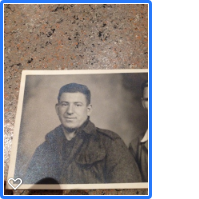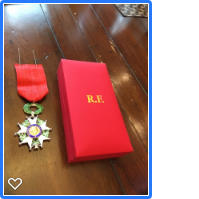When 21 -year-old Judy Fromstein married her husband Gary Neinstein at a Toronto synagogue in 1966, the newspapers said “she was given in marriage by her uncle Harold Fromstein.” Corporal Harold “Red” Fromstein, a decorated Canadian World War Two soldier, was standing in that day for his older brother Hyman, Judy’s father, who had died two years earlier. It was a responsibility that Harold continued to take seriously for the rest of his life.
Perhaps looking after Judy, and her two brothers meant more to Fromstein then winning a Military Medal for bravery under fire in a German forest in 1945. After all, Fromstein knew what it meant to grow up without the guidance of a loving parent.
Fromstein was raised on Major Street, in Toronto’s heavily Jewish neighbourhood west of Spadina Avenue at College. His mother Annie died following childbirth, just days after he was born, in 1923. Fromstein’s father Simon died a decade later, when Harold was only 11. Suddenly Harold and his six older brothers were now orphans. Harold and his brother Albert were placed in a foster home, but Fromstein ran away, and never finished high school. “I was…the youngest…I was the trouble-maker. I was a very bad kid as a child,” he insisted, in a 2015 interview. “Going on backs of cars for a ride. We never had money. Never had money.”
The teenager spent a few years hitchhiking around Ontario and Quebec looking for jobs, including working as an elevator operator for a short time, on a farm as a labourer and for his brother’s tailor supplies store in Toronto. Eventually he wound up in Montreal, and when the war broke out, Fromstein enlisted with the Victoria Rifles of Canada, using his older brother Albert’s identification papers (Harold was only 17 in 1940). He told the interviewers he felt “a sense of duty” to enlist.
Harold Fromstein landed in Normandy a month after D-Day, in July 1944, and was soon attached to the Royal Highland Regiment (Black Watch), a Montreal-based outfit that had been nearly wiped out in the Dieppe raid of August 1942. During the Battle of Verrières Ridge three weeks later, on July 25, 1944, most of Fromstein’s Black Watch comrades were killed or captured. He took a machine gun bullet in his neck and another near his eye. He tore off his dog tags just before he was briefly captured by the Nazis, so they wouldn’t know he was a Jew. The Germans treated him, and soon after, the Americans liberated the hospital. Fromstein eventually made it back to convalesce in Britain. But five months later, with a six inch scar on the back of his neck, he was back in action, serving as a stretcher-bearer with the Canadians when the Allies pushed the desperate and outnumbered German defenders back across the Rhine River.

The citation for his Military Medal said he saved the lives of several of his men in late February 1945 when he “organized stretcher parties and personally aided in evacuating casualties over a distance of several thousand yards,” all the while under German mortar and machine gun fire in the Hochwald Forest. The military actually awarded the medal to Harold’s brother Albert Fromstein, the name Harold used while in uniform. Without computers to help them search, the officers never knew the real Albert Fromstein was actually serving with the Royal Canadian Air Force in Vancouver Island. After the war, Harold eventually confessed to fudging his identity, and told the military who he was.
Neinstein says he didn’t bring the military medal home, nor any of the others he was awarded as a veteran. She says he felt he didn’t deserve any of them, and had thrown them overboard en route back to Canada.
Harold returned to Toronto, where he worked for decades as a bartender at the legendary Imperial Bar and Hotel on Dundas Street East. He never married, but continued to help raise his brother’s children, even long after they began families of their own. For the past decade, Fromstein lived at the Veterans “K” Wing at Sunnybrook Hospital in Toronto, where his niece Judy, now a grandmother in her 70s, was a regular visitor. In the summer of 2017, Neinstein wrote to Veterans Affairs Canada in Ottawa to try to get all her uncle’s war medals replaced.
Ottawa did replace the Canadian medals. But there was one more medal Harold never got to see: the government of France has been bestowing the Legion d’honneur cross on thousands of living Allied veterans who participated in D-Day and the liberation of France in 1944. Neinstein applied, but Ottawa had to evaluate Fromstein’s record before the paperwork was passed on to the French Embassy. She was told the process could take six months.
Her uncle Harold died in February of this year. He was buried in a “simple but very moving” graveside service at Bathurst Lawn Memorial Park, Neinstein said.

The Legion d’honneur medal arrived on Aug. 13, 2018. The accompanying citation congratulates Fromstein for being honoured with the rank of Knight of the French National Order of the Legion of Honour, France’s highest national honour. “You can therefore proudly wear this insignia, which attests to your courage and your devotion to the ideals of liberty and peace,” wrote Kareen Rispal, the French ambassador.
Neinstein takes comfort in the fact that the elegant satin box — containing the distinctive green and while silver cross— bears the initials R.F. They stand for République de France, of course, but Neinstein prefers to think that they are for her uncle, “Red” Fromstein.
